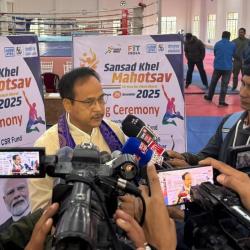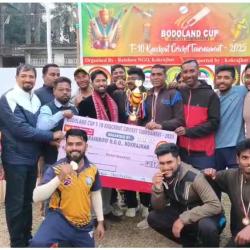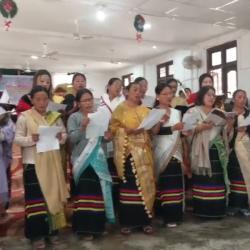A 'jattha' will begin on 26 January 2008 from Nandigram in West Bengal marching and connecting all people's struggles and movements across the states of India to end in Gorai, Mumbai, Maharashtra on 4 February 2008. A mid high-point will be when it reaches Narmada valley where one of the biggest people's movements since India's independence struggle is still ensuing.
"The Nandigram struggle has created history. The adverse impact of imperialist globalization and the primacy of capital and market on India's polity is clearly visible not only in Nandigram struggle but also from the struggle by farmers, workers, Dalits, Adivasis across the country. The illusory development slogans churned out by this process facilitates assault not only on our natural resources and cultural heritage but also destroys the ethos of equity, simplicity, democracy and sovereignty" said Dr Sandeep Pandey, national convener of National Alliance of People's Movements (NAPM) and Ramon Magsaysay Awardee 2002.
Women, farmers, workers are engaged in major struggles to protect their lands, livelihoods, water resources and lifestyles all over the country. The struggles have sprung up all over the country to fight for sustainable development, for employment-generating village-industries, self-reliant agriculture and decentralised democratic development-planning alternatives.
"But the arrogant and indifferent governments are hell bent on crushing this people-centric development by approving over 600 SEZs across the country. Innumerable SEZs are devouring not only pristine agriculture, natural wealth but are also destroying people's lives and livelihoods without providing any rehabilitation" said Dr Pandey.
"We have been left with no choice but to challenge the whole process of globalization resulting in suicides of farmers (over one lakh now) which in no way could be called suicides-in fact they are being murdered in the name of developmental economic fundamentalism, by all those who are forgetting their socialist commitments and the sanctity of the Indian Constitution. The present mainstream political parties are not ready to admit the above, since the majority of the mainstream political party leaders have compromised with imperialism, capitalism and western consumerist ideology" further elaborates Dr Pandey.
Democratic socialism and sustainable development with people's participation in decision making are the fundamental commitments which need to be upheld. "People are questioning and seeking solutions, as they very well know that they can survive only when they are able to save human relationships, sustainable environment, democracy and socialism" says Mukta Srivastava from NAPM.
Under such circumstances, there is a vital need to relate and link these people's movements to strengthen them mutually and also to build a stronger voice of the most unheard in Indian democracy.
Nandigram, which has now achieved the status not only of the protest against the economic domination and state repression, but a symbol of martyrdom, will be the starting point of this Jattha on 26 January 2008 and will pass through Indian states of Jharkhand, Chattisgarh, Madhya Pradesh, Maharashtra to conclude on 4 February 2008 in Gorai, Mumbai, India.
Large number of people and people's representatives who are struggling against commercialisation, globalization, fundamentalism, communalism will join this Jattha. Krishi Jami Raksha Committee, Bhumi Ucched Pratirodh Committee, ACTION 2007, National Hawkers Federation, Narmada Bachao Andolan, National Alliance of People's Movements (NAPM), National Fish Workers Forum, Samajwadi Jan Parishad, Madhya Pradesh, Ekvira Jamin Bachao Sangharsh Samiti , Lonavala , Maharashtra, Tata Dhran Grasth Sangharsh Samiti, Lonavala, Maharashtra, Dharavi, Peth Bachao Samiti , Gorai, Mumbai, Jharkhand Krantikari Majdoor Union, Bokaro, Jangal Bachao Andolan, Jharkhand, Nagri Haq Surasha Samiti, Pimpari Chinchawat, Maharashtra, Ulgulan Manch, Jharkhand and several others ongoing people's movements in different parts of India are participating in this Jattha march.
"The Nandigram struggle has created history. The adverse impact of imperialist globalization and the primacy of capital and market on India's polity is clearly visible not only in Nandigram struggle but also from the struggle by farmers, workers, Dalits, Adivasis across the country. The illusory development slogans churned out by this process facilitates assault not only on our natural resources and cultural heritage but also destroys the ethos of equity, simplicity, democracy and sovereignty" said Dr Sandeep Pandey, national convener of National Alliance of People's Movements (NAPM) and Ramon Magsaysay Awardee 2002.
Women, farmers, workers are engaged in major struggles to protect their lands, livelihoods, water resources and lifestyles all over the country. The struggles have sprung up all over the country to fight for sustainable development, for employment-generating village-industries, self-reliant agriculture and decentralised democratic development-planning alternatives.
"But the arrogant and indifferent governments are hell bent on crushing this people-centric development by approving over 600 SEZs across the country. Innumerable SEZs are devouring not only pristine agriculture, natural wealth but are also destroying people's lives and livelihoods without providing any rehabilitation" said Dr Pandey.
"We have been left with no choice but to challenge the whole process of globalization resulting in suicides of farmers (over one lakh now) which in no way could be called suicides-in fact they are being murdered in the name of developmental economic fundamentalism, by all those who are forgetting their socialist commitments and the sanctity of the Indian Constitution. The present mainstream political parties are not ready to admit the above, since the majority of the mainstream political party leaders have compromised with imperialism, capitalism and western consumerist ideology" further elaborates Dr Pandey.
Democratic socialism and sustainable development with people's participation in decision making are the fundamental commitments which need to be upheld. "People are questioning and seeking solutions, as they very well know that they can survive only when they are able to save human relationships, sustainable environment, democracy and socialism" says Mukta Srivastava from NAPM.
Under such circumstances, there is a vital need to relate and link these people's movements to strengthen them mutually and also to build a stronger voice of the most unheard in Indian democracy.
Nandigram, which has now achieved the status not only of the protest against the economic domination and state repression, but a symbol of martyrdom, will be the starting point of this Jattha on 26 January 2008 and will pass through Indian states of Jharkhand, Chattisgarh, Madhya Pradesh, Maharashtra to conclude on 4 February 2008 in Gorai, Mumbai, India.
Large number of people and people's representatives who are struggling against commercialisation, globalization, fundamentalism, communalism will join this Jattha. Krishi Jami Raksha Committee, Bhumi Ucched Pratirodh Committee, ACTION 2007, National Hawkers Federation, Narmada Bachao Andolan, National Alliance of People's Movements (NAPM), National Fish Workers Forum, Samajwadi Jan Parishad, Madhya Pradesh, Ekvira Jamin Bachao Sangharsh Samiti , Lonavala , Maharashtra, Tata Dhran Grasth Sangharsh Samiti, Lonavala, Maharashtra, Dharavi, Peth Bachao Samiti , Gorai, Mumbai, Jharkhand Krantikari Majdoor Union, Bokaro, Jangal Bachao Andolan, Jharkhand, Nagri Haq Surasha Samiti, Pimpari Chinchawat, Maharashtra, Ulgulan Manch, Jharkhand and several others ongoing people's movements in different parts of India are participating in this Jattha march.
- 9347 reads










Add new comment